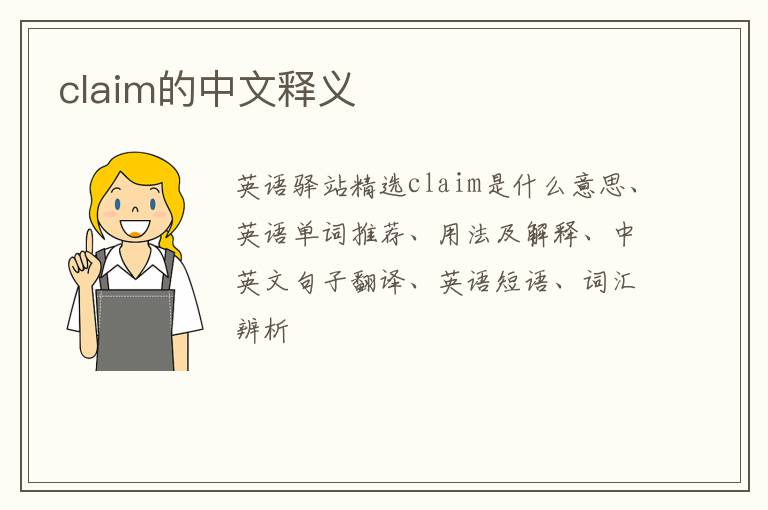
1.要求或索要(某事物)(因是应得的权利或财物);[I,T] [claim (for sth)]凭保险单要求赔偿(款项);索赔:
2.声称;宣称;断言
3.(指事物)需要, 值得
4.(指灾难、事故等)使(某人)失踪或死亡
n.
1. 可数名词: [claim (for sth)] 索款(作为保险金、赔偿、增薪等)
2.[C,U] [claim (to sth)
claim (on sb/sth)]对某事物的权利
3. 可数名词:称某事为事实的陈述;声称;断言:
4. 可数名词:索要之物(尤指土地)
词形变化
- 形容词 claimable
- 名称 claimer,claimant
- 时态 claimed,claiming,claims
- 这些动词均有“要求,请求”之意。
ask最普通用词,指向对方提出要求或请求,长、晚辈,上下级之间都可使用。
beg指恳切地或再三地请求或要求,常含低三下四意味,也多用于应酬场合。
demand一般指理直气壮地提出强烈要求,或坚持不让对方拒绝的要求。
require强调根据事业、需要或纪律、法律等而提出的要求。
request正式用词,指非常正式,有礼貌的请求或恳求,多含担心因种种原因对方不能答应的意味。
implore书面用词,着重指迫切、焦急或痛苦地恳求或哀求,常含较强的感情色彩。
claim指有权或宣称有权得到而公开提出的要求。
pray语气庄重,指热情、诚恳和敬祈的要求,现不很常用。
entreat泛指一般“恳求或哀求”,含企图说服对方或用热烈的请求软化反对意见的意味。 - 这些动词均含有“断言,声称”之意。
assert主观意味强,指自认为某事就是如此,而不管事实如何。
affirm侧重在作出断言时表现出的坚定与不可动摇的态度。
allege多指无真凭实据,不提供证据的断言或宣称。
maintain与assert近义,但前者指坚决维护某种主张或观点。
testify多指在法庭作证,庄严地宣称自己所说属实。
claim可与assert换用,但语气弱一些,侧重指行为自己的权利提出要求他人承认。
- ask for legally or make a legal claim to, as of debts, for example
- demand as being one‘s due or property; assert one‘s right or title to
- take as an undesirable consequence of some event or state of affairs
- assert or affirm strongly; state to be true or existing
- lay claim to; as of an idea
- an assertion of a right (as to money or property)
- an assertion that something is true or factual
- a demand especially in the phrase
- demand for something as rightful or due
- an informal right to something
- an established or recognized right
 proclaim的中文释义
proclaim的中文释义